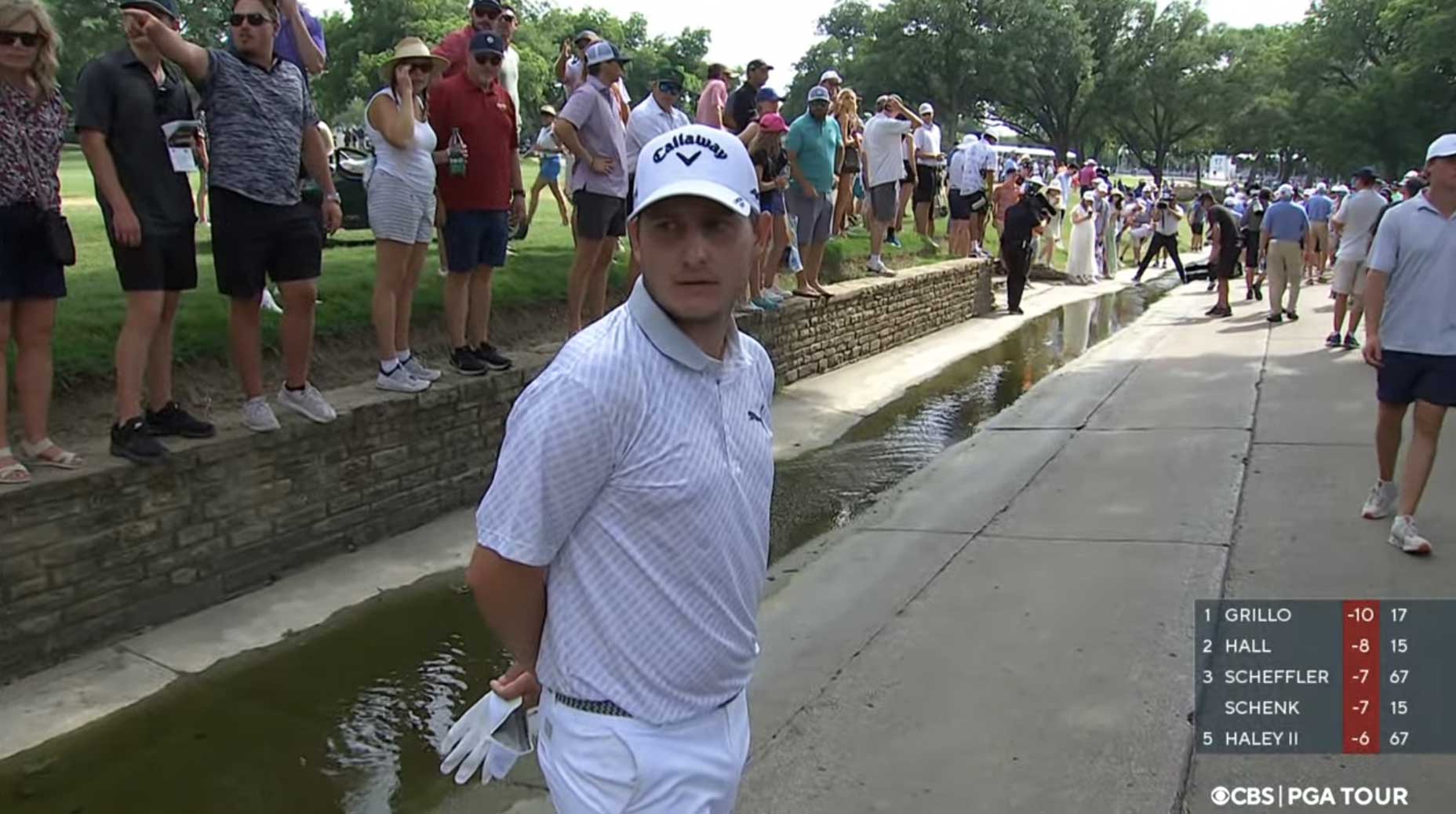Every week on the PGA Tour brings something new. Something just as bizarre as last week. And the week before. Why? Because the Rules of Golf can get weird. They’re strict. The field of play is different than other sporting fields. There are hazards and out of bounds and animals and uneven surfaces. How could it possibly be normal?
Since it’s not normal, boy, it sure can be entertaining. This week’s lead actor was Emiliano Grillo, the leader through 71 holes at the Charles Schwab Challenge. Not by just one shot, either. This was a comfy, two-shot lead.
Grillo grinded out a par on the 17th hole at Colonial Country Club, but then blocked his tee shot on 18, sending it bounding into what has been deemed a bizarre water hazard up the right side. It’s bizarre because it’s an aqueduct that runs through the course, all the way off the property, past TCU’s football stadium, extending as far as a full mile away. On the outer edges of the hazard is angled concrete, leading down to a slow, trickling stream at its center.
The most important aspect of that stream was that it was trickling back toward the tee box, so when Grillo’s tee ball found the water, it never came to rest. Slowly but surely, that ball stayed in motion, moving maybe a one foot per second backward in his direction.
For a man who hasn’t won on the PGA Tour in eight years, Grillo had to be on edge. In part because he needed to make a decision, and quickly. Because there’s a weird exemption in the Rules of Golf that would have allowed him to play that ball once it trickled into a nice angle for a recovery shot.
Rule 10 of the Rules of Golf governs when a player may make a stroke, and Rule 10.1d discusses the act of playing a ball that is in motion.
“A player must not make a stroke at a moving ball,” it says, but there is an interesting exemption written right beneath it. Exception 3 states, “When a ball is moving in temporary water or in water in a penalty area, the player may make a stroke.”
There might be only one place on Tour where this scenario is actually possible, but we found it Sunday. Grillo walked up the fairway as his ball slowly moved back toward him. By now, most of the spectators in the area were cheering as the ball continued to move. Then, a couple cameramen stepped in close, even straddling the small stream as the ball moseyed along.
After a few minutes passed and Grillo had arrived, the ball was nowhere near resting. It trundled and trundled, aided by the slight decline of the aqueduct. CBS even used drone cameras hovering above to show the spectators moving alongside it.
Mark Dusbabek, the PGA Tour’s ruling official, joined the broadcast to explain that Grillo did in fact have the option to play the ball as it was moving. It sounded weird to anyone listening intently. But it was either that, wait for it to come to a stop further from the hole — a location we wouldn’t be able to predict — or drop where it originally crossed into the penalty area. Had he walked through Door No. 1, it would have made for and incredible visual, with ball and water splashing back toward the fairway on the final hole of regulation, spectators watching along in the background.
Grillo must have been giving it some thought as his ball continued moving, because he didn’t make up his mind quickly. He admitted afterward that he had actually been in this exact situation before.
“I’ve hit it there,” Grillo said. “I knew, as soon as I saw the ball going right, I was like, ‘This is going to be a very long hole.’ I’ve been through that pain of watching the ball just roll 120 yards back.”
About 10 minutes had passed between the original tee shot and Dusbabek’s second appearance on the broadcast, where he clarified that the competition committee wasn’t going to wait any longer.
“We as a committee have been talking about it but enough time has taken place and he has been given enough time to make a decision here, so we’re going to make him go back to where it last crossed,” Dusbabek said.
It all seemed to be happening on a perfectly planned script because the ball finally nudged up against a rock and came to a rest about 144 yards back from where it crossed into the penalty area. Grillo could have easily dropped another ball much sooner and forgotten about that first shot altogether, but he calmly went back and plucked that ball for himself. He would drop twice on a cart path, then place his ball on the hard surface and play up the hole.
Did he make the right move? It’s certainly plausible he could have made a bogey 5 in regulation by playing his moving ball from the stream. He also very well could have made a double-bogey 6, which would have still earned him a spot in the playoff. Sadly, we’ll never know. The 6 he did make was enough to create a nervy wait as the final pairing played up 18, but eventually Grillo beat Adam Schenk in the playoff for his second career victory. We’ll have to wait another 12 months for next year’s tournament to see if anyone would be brave enough to do as Grillo didn’t. Perhaps the whole ordeal gave some Tour pros something to think about.
